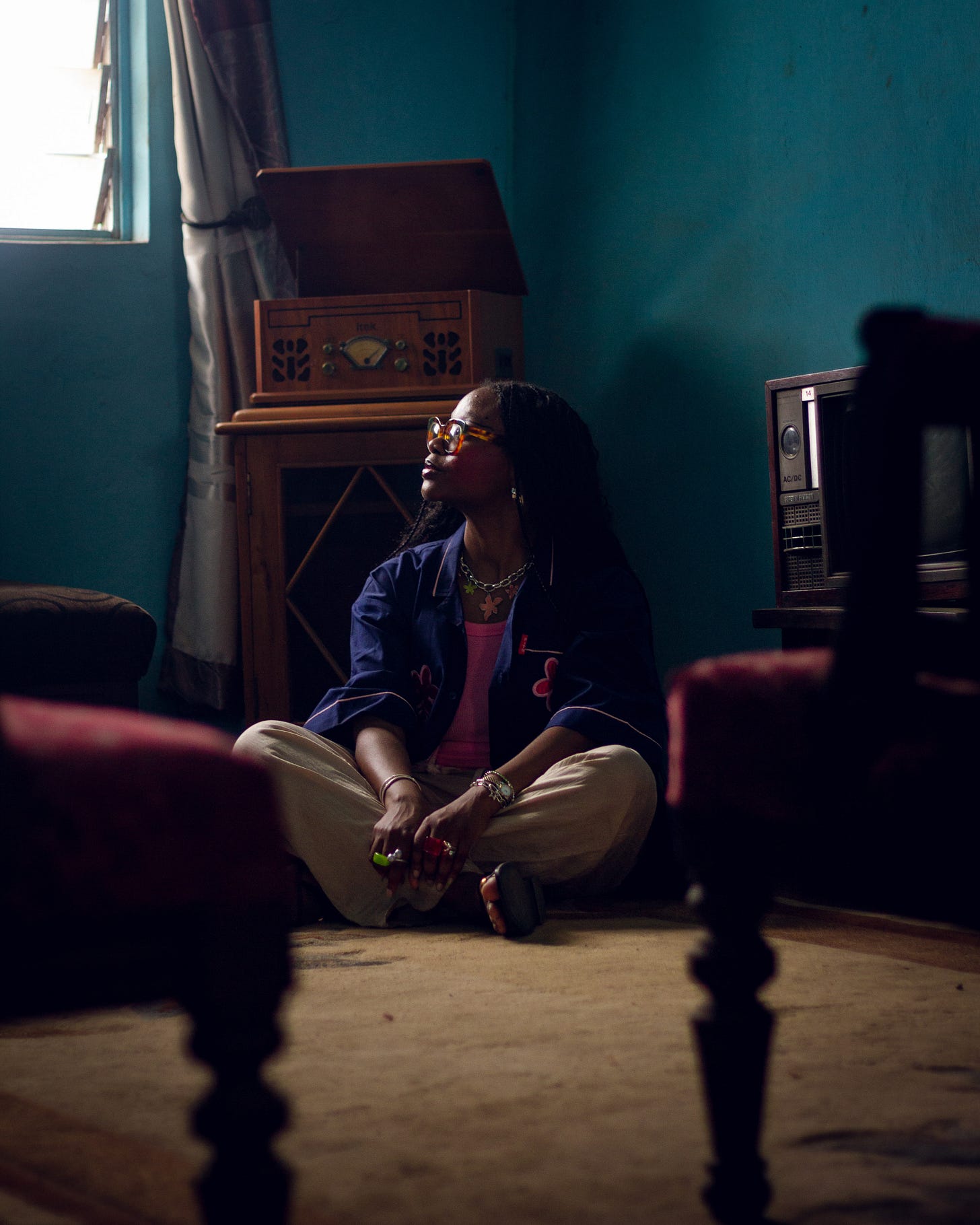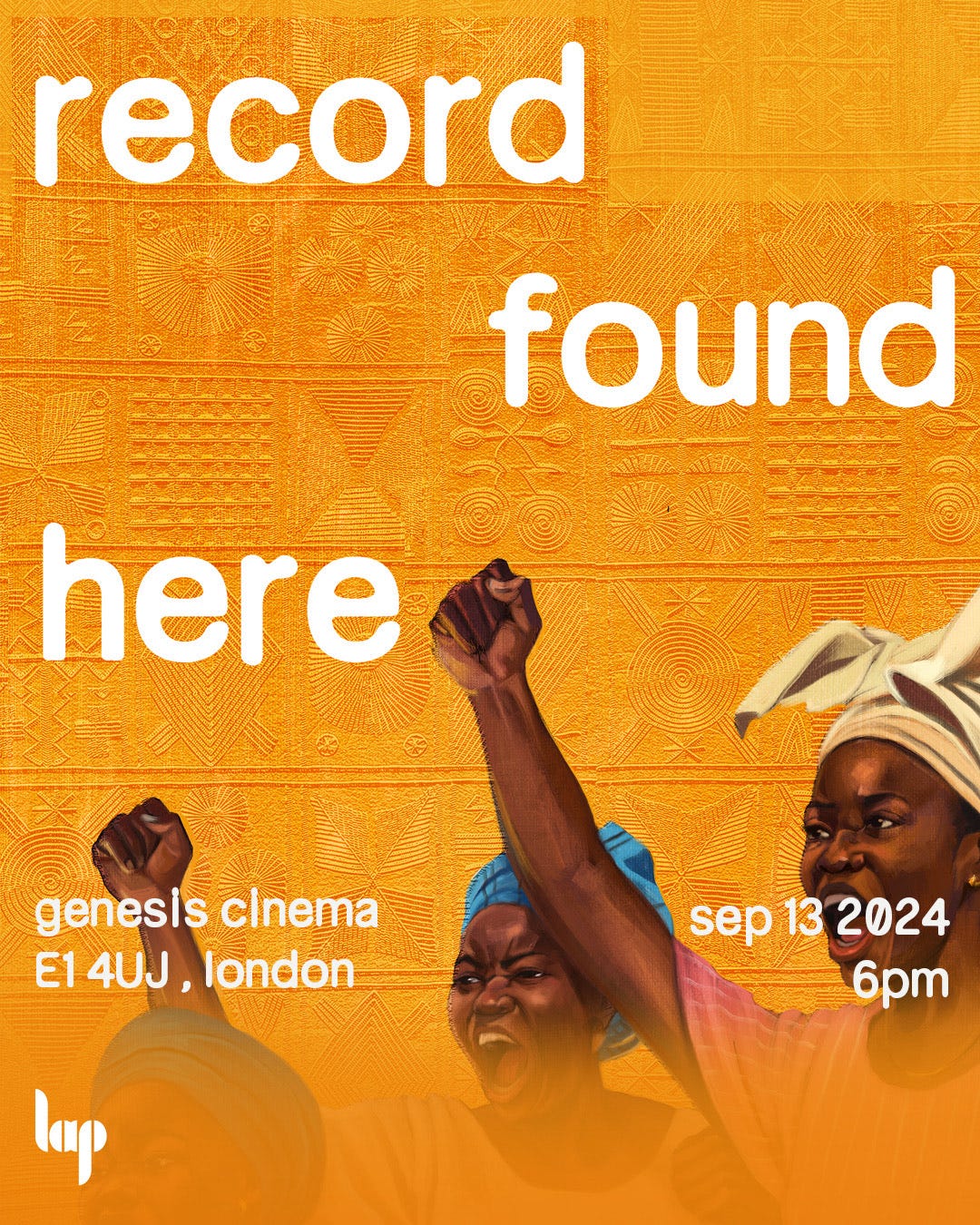45. What Does Revolution Sound Like?
On Yoruba protest songs, patriarchy and defiant Egba women
Today, enjoy a rare treat, a guest post by lanaire aderemi, brilliant scholar, musician, writer and filmmaker. She writes about her new documentary film, ‘record found here’, and pointedly about protest songs. Read my response below her eloquent prose.
10 years ago, my grandmother shared a fascinating story with me. She spoke about the brilliance, brazenness and beauty of Abeokuta women revolting against patriarchal and colonial violence in 1949. These women, she said, boycotted the heavy taxes levied on them by the British and administered by the reigning monarch.
In 2024, inspired by my grandmother’s powerful testimony of the Egba Women’s Revolt, I travelled to Abeokuta. I visited the Kuti Heritage Museum (formerly home to the Ransome-Kutis’) and the Centenary Hall, Abeokuta, interviewing women who witnessed the revolt. I also sat in Mrs. Funmilayo Ransome-Kuti’s home, saw her study and Fela’s piano.
lanaire at Kuti Heritage Museum. Photo credit: Nimi Adeyemo
Determined to learn about the songs the Abeokuta Women Union created, I read Professor Stephanie Shonekan’s (2009) paper. This paper re-energised me as I discovered the powerful lyrics of ‘Enough is Enough’ and ‘Abeokuta Women Union’ which captured the Egba Women’s courage, wit and commitment. I would be surprised if Fela was not influenced by his mother’s lyricism. They both engendered a participatory ethos in their activism and music, particularly the use of ‘repetition, call and response and emphasis’ to articulate bold visions of freedom.
Dare Balogun selected the songs in record found here. His criteria was to find music filled with proverbial wisdom and a call to action — akin to the courageous and revolutionary spirit of the Abeokuta Women’s Union.
A critical understanding of history allows us to make sense of the present and understand ways to chart better futures. This film attempts to preserve an important moment in Nigerian’s history which has largely been erased from our collective imagination and educational curriculum.
So what does revolution sound like? I say it sounds like mourning then dancing since joy comes in the mourning. And how might we capture the joy? I say ‘record found here’ is proof that joy is within reach amidst the rotten happenings of our state.
My documentary film record found here has been screened in Lagos, New York, Maryland and Stellenbosch and on the 13th of September, if you’re in London, you can witness history too. You can buy tickets through this link.
—lanaire
I was struck by the music playing in the background of this trailer. I thought it was Suberu Oni and Why Worry Orchestra. Did a quick YouTube comb. Then it occured to me that it could be the soulful Theophilus Iwalokun. lanaire confirmed it was.
I told her that Suberu Oni, my first wrong choice, were a duo, contemporaries of Iwalokun, all practitioners of modern juju music. Their cohort includes Tunde Nightingale, Ambrose Campbell, Ayinde Bakare and Ojoge Daniel (who trained IK Dairo). One of half of the Suberu Oni was King Sunny Ade’s maternal uncle. In Yoruba life, there are a tangle of connections.
Juju music is a commemorative music, which should mean that an event like the forced abdication of a powerful Yoruba monarch should be recorded in our songs. But this event is the kind exempt from the genre. Juju is likely to praise the king and disparage his critics. The gender skew of Juju is another matter; a woman juju star, Oladunni Decency, would not emerge until at least 20 years after the Abeokuta Women revolt. Sadly Oladunni Decency died young.
I may have better luck researching Waka music, Batile Alake, Iya Aladuke, Comfort Omoge to better understand the notions of female agency. Till then, enjoy my playlist on Juju Music. Should you be in London on September 13, plan to see lanaire’s film.
—Dami







